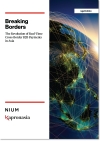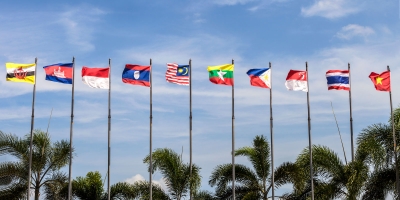Latest Insight
- Why an expected APAC fintech consolidation wave has yet to come
- Why cash is still prevalent in Asia
- Japan steps up green finance efforts
- South Korea charts middle path on crypto
- Should Grab and GoTo merge?
- Singapore pushes ahead with fintech-driven sustainability
- Digital banks in South Korea continue to thrive
- Billease is the rare profitable BNPL firm
- Fintech sector in Pakistan faces mounting challenges
- Where digital banks in Asia can make a difference
Latest Reports
-
Breaking Borders
 Despite progress in payment systems, the absence of a unified, cross-border Real-Time Payments (RTP) network means that intermediaries play a crucial role in facilitating connectivity. This report examines the ongoing complexities, challenges, and initiatives in creating a seamless payment landscape across Asia. Innovate to Elevate
Despite progress in payment systems, the absence of a unified, cross-border Real-Time Payments (RTP) network means that intermediaries play a crucial role in facilitating connectivity. This report examines the ongoing complexities, challenges, and initiatives in creating a seamless payment landscape across Asia. Innovate to Elevate In the dynamic and diverse financial landscape of the Asia-Pacific (APAC) region, banks are at a pivotal juncture, facing the twin imperatives of innovation and resilience to meet evolving consumer expectations and navigate digital disruption. Catalyzing Wealth Management In The Modern Era
In the dynamic and diverse financial landscape of the Asia-Pacific (APAC) region, banks are at a pivotal juncture, facing the twin imperatives of innovation and resilience to meet evolving consumer expectations and navigate digital disruption. Catalyzing Wealth Management In The Modern Era Hyper-personalized wealth management presents a paradigm shift from traditional models relying on static, generalized segments. Developing tailored investor personas based on psychographics, behaviours and fluid financial goals enables financial institutions to deliver rich and tailored customer experiences that resonate with next-generation priorities.
Hyper-personalized wealth management presents a paradigm shift from traditional models relying on static, generalized segments. Developing tailored investor personas based on psychographics, behaviours and fluid financial goals enables financial institutions to deliver rich and tailored customer experiences that resonate with next-generation priorities.
Events
| October 21, 2024 - October 24, 2024 Sibos Beijing |
| November 06, 2024 - November 08, 2024 Singapore Fintech Festival |
South Korea’s digital banks have been among the most successful online lenders in East Asia, benefiting from the network effect of their respective digital services platforms, relatively weak incumbent digital offerings and strong demand from the country’s retail banking market for new types of products. Yet as they expand into new market segments, in some cases rapidly, regulators are bound to take notice. This holds especially true for the mortgage loan segment.
In a rapidly digitizing world, many Asian countries are going cashless in order to create better, faster, and cheaper payment infrastructure. But should 100% cashless be the goal?
While cashless transactions offer clear benefits, significant barriers exist to achieving a completely cashless society. Infrastructure limitations, inadequate digital literacy, and disparities in access to technology hinder the widespread adoption of digital payments in many Asian countries. In addition, cultural preferences and the role of cash in informal economies are tough to dislodge.
In recent years, Japan’s largest banks have expanded rapidly in emerging Southeast Asia, from Indonesia to Thailand to Vietnam, as well as India. At the same time, they are making strategic investments in advanced economies such as the United States and Israel. With growth prospects at home facing constraints, from the aging population to the fact that the Japanese population is well banked, this search for growth overseas looks set to continue for some time.
Thailand’s Siam Commercial Bank (SCB) is among the most fintech-forward commercial banks in Asia. What makes SCB's digital finance strategy successful is that it leverages all the advantages of incumbency while using technology to develop products for the digital age.
Despite high expectations for China's digital currency, adoption of the e-CNY for retail payments in the country remains modest at best. A key issue, and one we have been discussing for several years now, is interoperability with the existing, very effective digital payments ecosystem. The e-CNY is unlikely to be more than a novelty unless it can be fully interoperable with Alipay and WeChat Pay.
Asean has a cross-border payments dream that is slowly moving closer to coming true. Despite the very real interoperability challenges, Southeast Asian countries nonetheless seem determined to build a payments rail of their own that can boost the use of local currencies – perhaps at the dollar’s expense – while speeding up transaction time, lowering transaction costs and strengthening connectivity among their respective financial systems. The latest countries to sign onto this project are the Philippines, Vietnam and Brunei.
In late August, the China Securities Regulatory Commission (CSRC) said that it would start a phased restriction on IPOs to boost "dynamic equilibrium" between investment and financing. The CSRC has not yet said how long the curbs will last, and market insiders foresee stricter IPO vetting and a longer registration process.
Just when it seemed Capital A had put aside its digital banking ambitions, the ever-ambitious airline/platform company announced its partnership with the Philippines’ ascendant online lender UnionDigital Bank. The tie-up between Capital A and UnionDigital Bank comes amid a growing travel recovery in Southeast Asia and strong demand for digital financial services in the Philippines.
When a digital bank reaches profitability quickly, as in positive net income, it is always worth exploring in detail. After all, it is the exception, not the rule. In the case of the Philippines’ UnionDigital Bank, there is more to the story than meets the eye.
Most of the time when we write about Singapore’s rise as a wealth management hub, the news is overwhelmingly positive. But every so often, the risks inherent to taking on that role become glaringly apparent. Singapore is no stranger to money laundering risks, especially after several banks in the city-state were involved with the 1MDB mega scandal. However, in the S$1 billion money laundering investigation Singapore is currently undertaking, it seems the city-state is the center of the alleged crimes rather than Malaysia or another country.
More...
Is the Philippines’ Maya Bank the best digital lender in Southeast Asia? The Digital Banker certainly thinks so. On a recent top 10 list compiled by that publication, Maya was the only Southeast Asian digibanks and No. 8 overall alongside digibanks such as Starling, Revolut, WeBank, MOX Bank and Kakao Bank.
It’s earnings season and Southeast Asia’s platform companies are trying once again to convince investors that they are on the path to profitability. The jury is still out as far as we’re concerned, especially in the case of any company that started out in the business of ride hailing and until recently emphasized growth at all costs. Having lost 75% of its market valuation since going public a little over a year ago, SoftBank and GIC-backed GoTo has yet to convince investors that it has turned a corner on the path to profitability, and we see little in its second-quarter earnings results that suggest anything has fundamentally changed for the better.
Investors are bullish on the potential of Singapore-based digital wealth management platform Endowus. Though the company’s current revenue is modest, and profitability remains very much in the future, Endowus still managed to recently raise US$35 million from some huge banks and four Asian billionaire families.
Sea Group’s stock took a pummeling on Tuesday, falling almost 29% to US$40.58 as investors reacted to a second quarter earnings report in which the company missed revenue forecasts though made a profit of US$331 million. In a nutshell, Sea’s triumvirate of digital services that once looked unassailable now seems a bit shaky as consumer spending in many of its key markets is not robust. We think the fintech business still has plenty of potential, and probably the same holds true for e-commerce, but the erstwhile profitable gaming arm has become a laggard.
Buy now, pay later (BNPL) has surged in Indonesia over the past few years, plugging a large lending gap and in many cases acting like a credit card in all but name. BNPL has grown so briskly in Indonesia that some analysts believe it will replace credit cards altogether.Perhaps not.















